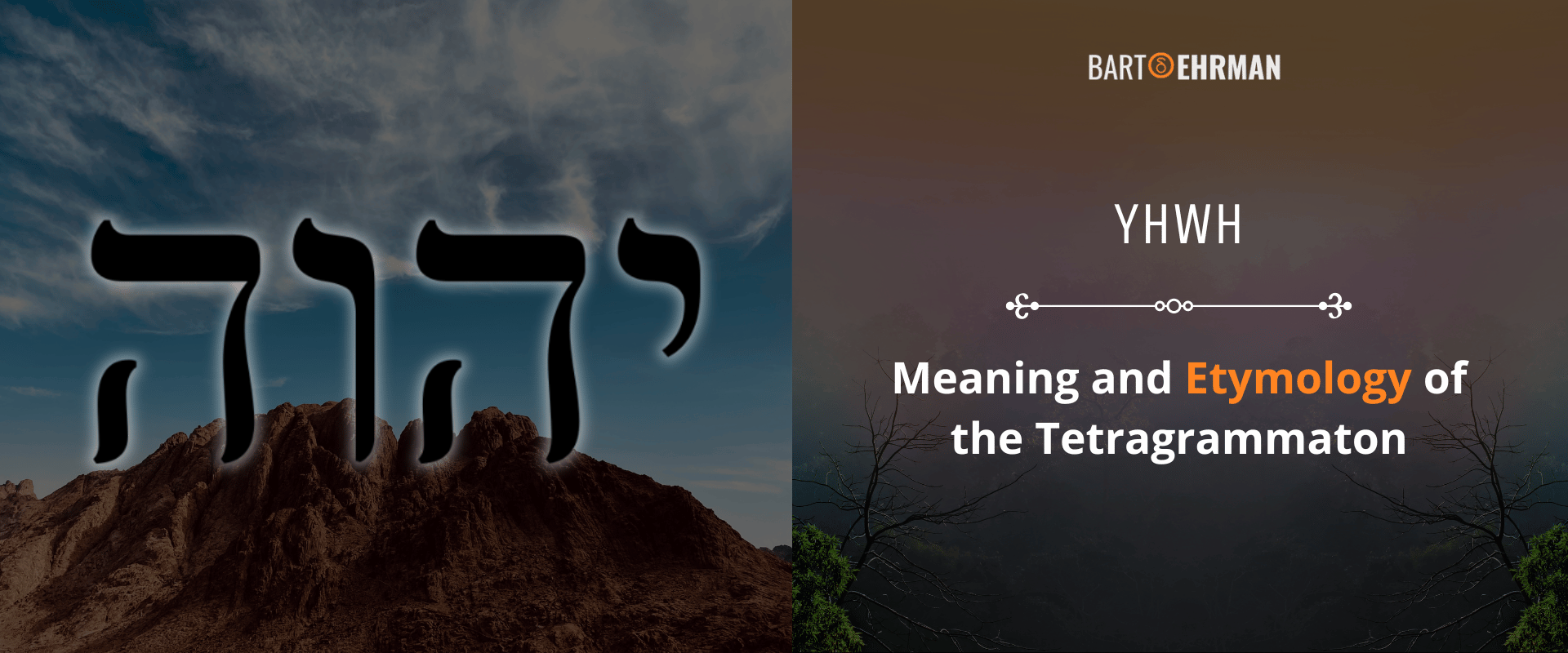YHWH: Meaning and Etymology of the Tetragrammaton

Written by Joshua Schachterle, Ph.D
Author | Professor | Scholar
Author | Professor | BE Contributor
Verified! See our editorial guidelines
Verified! See our guidelines
Date written: July 27th, 2024
Disclaimer: The views and opinions expressed in this article belong to the author and do not necessarily match my own. - Dr. Bart D. Ehrman
In the iconic biblical tale of the burning bush from Exodus 3, Moses stands before a mysterious presence that speaks to him, revealing itself with a divine name that has resonated through millennia of religious and scholarly inquiry: YHWH (also written as Yahweh). When written in Hebrew, this name is known as the Tetragrammaton.
In this article, I’ll examine Yahweh’s meaning in Hebrew, discuss debates about its pronunciation, investigate its historical origins, and consider the evolving reverence associated with YHWH, shedding light on its enduring theological and cultural impact.

Yahweh Meaning and Etymology
The name “Yahweh” or YHWH is called the Tetragrammaton — Greek for “four letters” — because it consists of only four Hebrew letters: yodh, he, waw, and he. That’s why it’s usually transliterated as YHWH. This isn’t an abbreviation, though.
The Hebrew language, until at least the 7th century CE, contained no written vowels (after that, points indicating vowel sounds were added underneath the letters). Literate Hebrew speakers in ancient times simply knew which vowel sounds went with which combinations of consonant sounds.
This brings us to the pronunciation of the Tetragrammaton. Since there were no vowel sounds written, how did people pronounce the name in ancient Hebrew? I should note here that, for centuries, the practice in Judaism has been not to vocalize the name at all, an indication of the name’s holiness. More on this later.
In his translation and commentary on the Hebrew Bible, Robert Alter notes that the broad scholarly consensus says the original pronunciation of the name was “YAH-weh.” There are differing opinions, however. (Affiliate Disclaimer: We may earn commissions on products you purchase through this page at no additional cost to you. Thank you for supporting our site!) In The Invention of God, Thomas Römer claims the Tetragrammaton would have been pronounced 'Yahô' or 'Yahû. Max Reisel, on the other hand, argues in The Mysterious Name of Y.H.W.H that it would have been pronounced YeHūàH.
It was certain Christian groups who began pronouncing the name as “Jehovah.” In his commentary on Genesis, R.R. Reno says this happened because in the Middle Ages, Jewish scholars inserted indications of vowel sounds — the “points” I mentioned above — into the Hebrew Bible, indicating the Tetragrammaton should be pronounced “Adonai.” By then, the Jewish practice was never to pronounce the name of Yahweh, substituting “Adonai” or another word in its place. However, non-Jews then mistakenly combined the vowels of “Adonai” with the consonants of the Tetragrammaton, accidentally inventing the name "Jehovah."
But what is the meaning of Yahweh in Hebrew? In terms of its etymological origins, Anne Marie Kitz argues that the word may come from a verb that means "to be,""to exist," "to bring into being," or "to occur." This makes sense given the name God tells Moses his name in Exodus 3:14: ’ehye ’ăšer ’ehye. Here, the word ’ehye directly relates to the word Yahweh, meaning “I am”. The Hebrew phrase can be translated as either “I am who I am,” or “I will be what I will be.”
While it is not the only name for God in the Hebrew Bible, YHWH is the one used most. Crawford Howell Toy and Ludwig Blau note that it is found 5,410 times in the Hebrew Bible. It occurs in almost every single book, the only exceptions being Ecclesiastes, Esther, and the Song of Songs.
The History of YHWH
It turns out that a god named YHWH may have begun life well before the formation of Israel. However, in his book Yahweh Before Israel: Glimpses of History in a Divine Name, Daniel Fleming says that while there are many theories, there is almost no broad scholarly consensus on the origins of the Israelite god Yahweh.
Fleming notes that one of the earliest non-Biblical references to Yahweh is from an inscription from the king of Moab around 840 BCE. While this is before most of the Hebrew Bible was written, scholars know its authors penned some of the oldest sections of it during that era. Since there are so few allusions to YHWH outside the Bible, scholars have long theorized about this god’s origins.
One possibility explaining YHWH’s origins is called the Midianite Hypothesis. This theory says that, rather than originating in Canaan, as many scholars have assumed, the cult of YHWH began just south of the Levant in the northwest Arabian Peninsula on the Red Sea, an area the Hebrew Bible calls "Midian." This theory, a product of 19th and 20th-century biblical scholars, states that YHWH originally was a Midianite storm-deity who eventually made his way north to the earliest Canaanites, some of whom became known as Israelites.
The Midianite Hypothesis is still considered plausible by many. However, in The Religion of Ancient Israel, Patrick Miller theorizes that YHWH is a short form of ˀel ḏū yahwī ṣabaˀôt, "El who creates the hosts.” El was another name for God used in the Hebrew Bible and known originally as the Canaanite high god. This would certainly make some sense since we know the Israelites were a subset of Canaanites.
The oldest reference to Yahweh is from an Egyptian inscription from sometime between 1390 and 1352 BCE that says, "YHWA (in) the Land of the Shasu." In this case, “YHWA” is a place name where the Shasu, a nomadic people group from Midian and Edom in northern Arabia, lived. While it’s tempting to think this is the origin of YHWH, Fleming points out that it’s uncertain whether a relationship really exists between the place name YHWA and name YHWH. Furthermore, while there is considerable scholarly support for this theory, no one has yet been able to explain how the name might have migrated north to Canaan.
When and Why Did Jews Stop Saying the Tetragrammaton Aloud?
Even in modern synagogues today, you will never hear the name “YHWH.” Instead, if someone reads aloud from the Hebrew Bible, they will substitute one of several acceptable words for the name of God, usually Hashem (English: “The Name”), Adonai (English: Lord), or Elohim (English: God). Even in English, Jewish texts will often omit a letter from the word “God,” writing the divine name as “G_d.” Scholars agree that the name YHWH was originally pronounced aloud so when did this practice begin and why?
Stephen Harris says in Understanding the Bible: A Reader's Introduction, that it likely started in the 3rd century BCE, probably as a way to ensure that people would always maintain reverence for God and God’s name. This may explain, for example, why one of the Ten Commandments from Exodus 20 says “You shall not make wrongful use of the name of the Lord your God, for the Lord will not acquit anyone who misuses his name.”
Interestingly, the Septuagint — the Greek translation of the Hebrew Bible used by the New Testament’s authors — usually translates the Tetragrammaton with the Greek word Kurios (English: Lord), a likely reference to the way Jews would say “Adonai” or “Lord” for the Tetragrammaton. In Exodus 3:14, however, rather than using a special word for God’s name, the Greek text merely uses the typical phrase for “I am” (Greek: ego eimi) instead of making it a title.
The name “YHWH” never appears in the New Testament either. But apologists have opined that all the “I am” sayings of Jesus in the Gospel of John refer to God based on Yahweh’s meaning, indicating Jesus is calling himself God. Is this accurate? Let’s look into this question.

Does Jesus Call Himself YHWH?
If you’re familiar with the Gospel of John, you know that Jesus’ teachings in that book differ greatly from those in the Synoptic Gospels. Almost all Jesus’ teachings in John are about who he is, usually explained in a list of metaphors by Jesus: “I am the Bread of Life,” “I am the Good Shepherd,” “I am the True Vine,” etc.
Some have pointed out that using “I am” over and over (46 times in John!) indicates Jesus is referring to God’s name given to Moses: I Am Who I Am. In John 8:58, Jesus says “Very truly, I tell you, before Abraham was, I am.” This certainly seems to be a claim that Jesus existed before Abraham and that he is, therefore, God. In fact, his hearers clearly believe this and want to stone him for blasphemy.
However, there is a slight twist to this rhetoric if you understand the viewpoint of John’s Gospel. As Bart Ehrman points out, John is the only Gospel that is not apocalyptic, as such. For John, as Ehrman says, “Eternal life in this Gospel does not come at the end of time… Eternal life is here and now, for all who believe in Jesus.”
In this Gospel, Jesus never talks about the coming Kingdom, since all one needs to do is believe in him now to have eternal life instantly. Ehrman says that, unlike typical Jewish apocalyptic writings, John’s Gospel doesn’t talk about the evils of the world vs. the good of the coming world. Instead, he divides the universe spatially into those from above who are saved and those from below who are condemned. The way to belong to the world from above, then, is simply to believe in Jesus who came from above.
What’s important, then, in John is not that Jesus IS YHWH, but that Jesus, as a lesser divine being, came from the world above — God’s world. That’s what he is indicating in those “I am” statements. Jesus is certainly divine, (perhaps) even equal with God. However, he is not YHWH or God the Father, but rather an agent of YHWH, doing God’s work in the world.
Conclusion
The etymology of YHWH is mysterious. Some claim that Yahweh in Hebrew derives from a verb meaning “to be” or “to bring into being,” but this is far from certain. While many Christian groups mispronounced it as Jehovah, most scholars agree its original pronunciation was “YAH-weh.”
Some scholars theorize it was originally the name of a storm-god from the southern Levant. Others believe it may have had an Egyptian origin, while still others assert it originated in Canaan, where the Israelites first emerged.
Sometime in the 3rd century BCE, Jews developed the practice of never pronouncing this divine name out of extreme reverence. Instead they used substitute words like “Adonai” or “Hashem” to refer to God without uttering the powerful divine name.
While the “I am” sayings in John certainly indicate that Jesus is divine, his divinity is relative. As we see in the prologue (“In the beginning was the Word”), Jesus is the agent sent forth to create the world by YHWH. In other words, Jesus acts for YHWH but is not YHWH.

